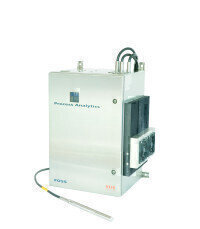Analytical instrumentation
FOSS NIRSystems provides robust Near-Infrared (NIR) solutions to the Petrochemical Industry
May 19 2010
FOSS NIRSystems has provided fast, precise, and accurate Near-Infrared (NIR) spectroscopy analyzers to a number of industries since the late 1970’s. NIR spectroscopy has many advantages over other methods of analysis, including speed (seconds), is non-destructive, requires no chemicals or solvents, and is capable of performing analysis on a number of components simultaneously.
FOSS NIRSystems has successfully implemented NIR for petrochemical analysis in the laboratory, as well as directly into processes in refineries. NIR was first used in the analysis of Research Octane Number (RON) in gasoline in the late 1980’s. The main use of the analysis was for octane blending, and helped minimize the “octane giveaway” by controlling this process in real time on-line. In addition, other parameters such as Aromatics, Olefins, Oxygenates, and Reid Vapour Pressure (RVP) are simultaneously measured. Samples are scanned as-is, either in laboratory instruments (in cuvettes or disposable vials) or in process streams (using fibre optic probes).
Diesel blending can similarly be monitored by NIR. Typical NIR analyses for Diesel are Density, Viscosity, D50%, D90%, D95%, and other important parameters like Pour Point, Cloud Point, and Cold Filter Plugging Point. These NIR analyses can be performed with the same NIR that does the gasoline analyses – the instrumentation and sample presentation for diesel and gasoline are identical. There is no need for a separate instrument for Gasoline and Diesel.
While these analyses of gasoline and diesel were originally performed in refinery labs or on-line, later uses of NIR for these materials was for Regulatory Fuel Screening to ensure compliance with local country standards. In this case the FOSS NIR analyzer is located in a small truck or van and powered by battery using an inverter. The vehicle moves to different service stations and samples both gasoline and diesel where analyses for several components are done on the spot. For example, gasoline is analysed for RON, Total Aromatics, and Olefins while Diesel is analysed for Density, Viscosity, Cetane (or Cetane Index), and Distillation Points using the same FOSS NIR instrument. Some countries are also measuring the amounts of ethanol in gasoline, and biodiesel in diesel as well. This type of fuel screening allows regulatory agencies to obtain instantaneous results, rather than sending samples for routine laboratory analysis (eg knock engine for RON), which is both time consuming and costly.
FOSS NIR analyzers are also used in a number of other parts of the petrochemical refinery. NIR has been used successfully to monitor the input and output streams of Crude Oil Distillation units, Naphtha Crackers, Reformers, and other downstream processes such as para-xylene. FOSS NIR analyzers have also been used to measure low levels of conjugated diolefins (measured as Maleic Anhydride Value, or MAV) in Hydrotreated Fluid Catalytic Cracking Gasolines. NIR provides information in real time that is then used to control these processes. One FOSS process NIR analyzer can be multiplexed to provide analyses from a number of different process streams.
FOSS NIR has advantages over all other methods of analysis, in that it is very fast, accurate, and reproducible, and is ideal for process control as well as for fuel screening purposes. NIR does not require any solvents or reagents for the analysis, and it is non-destructive. FOSS NIR analyzers provide multi-component analysis, and do not require highly trained experts to do the NIR analysis. The analyzers can be interfaced directly to a process line for process monitoring and control.
For more information about FOSS NIRSystems and our product line, please contact us!
Digital Edition
PIN 26.1 Feb/Mar 2025
March 2025
Analytical Instrumentation - Elemental Analysis for Quality and Process Control at Refineries, for Lubricants and Wear Metals in Engine Oils - Synthetic Lubricants: New Developments - Scaling...
View all digital editions
Events
Apr 29 2025 Mumbai, India
Apr 29 2025 Edmonton, AB, Canada
May 05 2025 Houston, Tx, USA
May 06 2025 Nuremberg, Germany
Canada Gas & LNG Exhibition & Conference
May 06 2025 Vancouver, BC, Canada
























